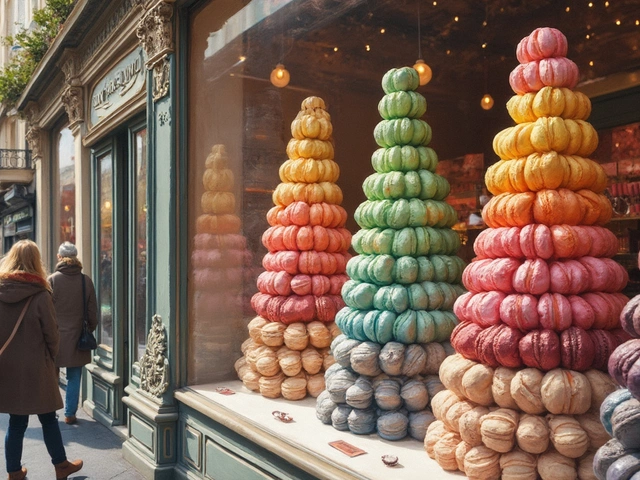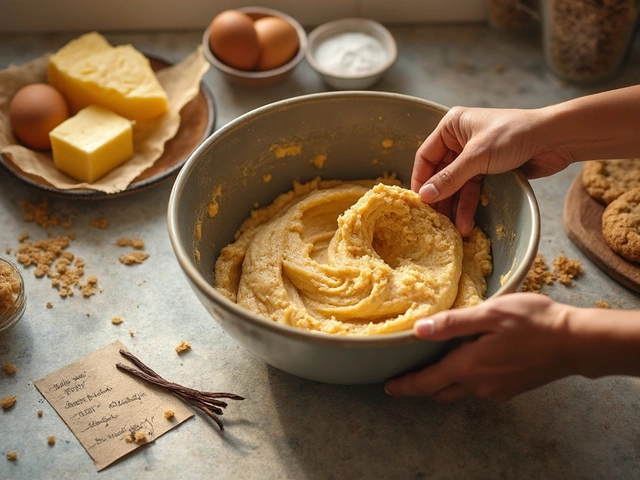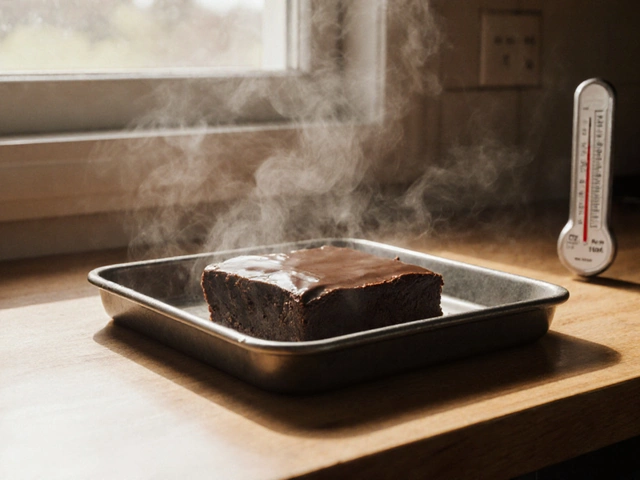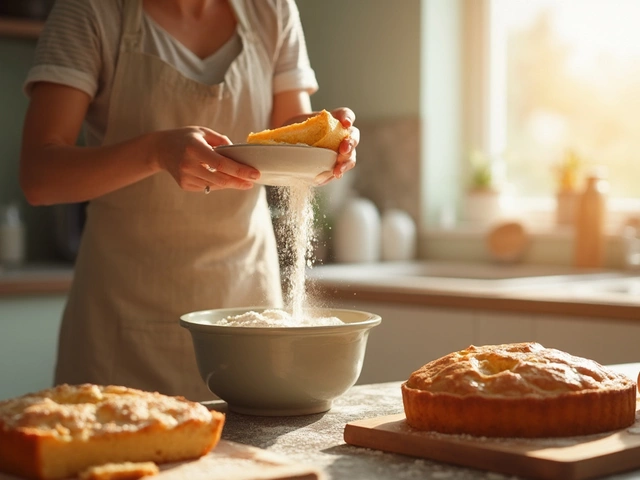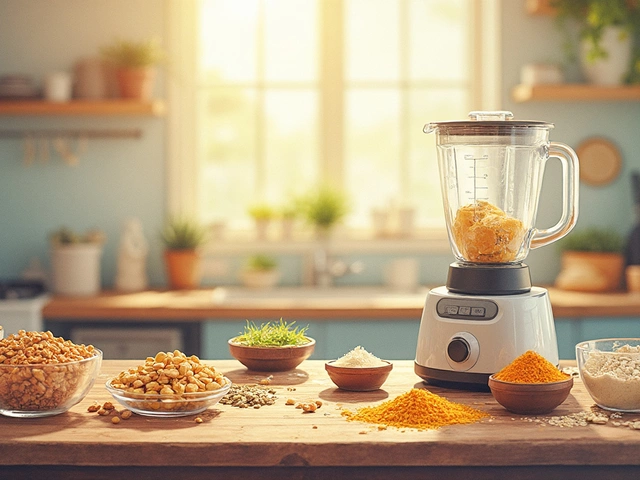
Ever reached for white wine vinegar, only to find an empty bottle and a stack of egg whites ready for pavlova? Before you nudge lemon juice into the scene, let’s set the record straight on what happens when you swap these two in your meringue. Not every acid does the job the same way, especially when you’re aiming for that glossy, cloud-like topping pavlova is famous for.
Some folks just want to know: will it actually work? Here’s the deal. Both white wine vinegar and lemon juice bring acid to the party—that’s what helps stabilize those egg whites so your pavlova doesn’t slump or weep. But the taste and chemistry behind them aren’t identical. If you only have lemons, don’t panic, but you might want to know how your meringue’s flavor and texture will shift before you dive in.
Stick around and I’ll break down what really happens when you swap, the right measurements, and some rookie mistakes to skip. Because nobody needs a collapsed pavlova or a surprise tang when all you wanted was a stress-free dessert.
- Why Acid Matters in Meringue
- Lemon Juice vs. White Wine Vinegar: The Science
- Taste and Texture: What You’ll Notice
- Swapping Ratios and Quick Tips
- Common Mistakes and Real-Life Advice
Why Acid Matters in Meringue
Here’s the backbone of a good pavlova: sturdy, shiny egg whites that stay put and hold those tall, fluffy peaks. But raw egg whites are pretty fragile as they whip up. That’s where a splash of acid, like lemon juice or white wine vinegar, jumps in. This isn’t some fancy chef trick—there’s real science behind it.
When you start beating egg whites, you’re whipping air into the proteins, which unfold and create a sort of mesh to trap those bubbles. Acid helps by slowing down the bonding of these proteins so they stretch out more evenly instead of clumping back together. This means the foam doesn’t collapse as easily, which gives you a better shot at the classic glossy, marshmallow-like meringue.
If you skip the acid, you’ll still get meringue, but it’s easy to overbeat. Too much mixing without acid and the whole thing can go grainy, dry, and flat—totally the opposite of what you want for a pavlova. And let’s be real, it’s so annoying when that happens after all your effort.
Check out this simple breakdown of why acid matters during whipping:
| Step | Without Acid | With Acid |
|---|---|---|
| Start Whipping | Foam forms fast, can be loose | Smoother, more stable foam |
| Midway | Peaks are soft, may collapse | Thicker peaks, steadier structure |
| Near Stiff Peaks | Overbeating risk is high | Stays creamy longer, less likely to split |
So, acid isn’t just some old wives’ tale—it’s a legit player in perfecting your meringue. Whether it’s lemon juice or vinegar, that tiny bit makes all the difference between pavlova pride and kitchen heartbreak.
Lemon Juice vs. White Wine Vinegar: The Science
Time to get real about what’s going on in your meringue when you add acid. Both lemon juice and white wine vinegar are used to keep those egg whites from falling flat. The acid makes the proteins in the egg whites stick together tight, giving you that classic, stable puff instead of a sad puddle.
But here’s the thing: not all acids hit the same way. White wine vinegar is mostly acetic acid, while lemon juice has citric acid—plus some extra flavor and a hint of bitterness. This does matter for both the science and the taste.
| Acid Source | Main Acid Type | Acidity Level (pH) * | Flavor Profile |
|---|---|---|---|
| White Wine Vinegar | Acetic Acid | 2.6-2.8 | Mild, slightly fruity, tangy but neutral in meringue |
| Lemon Juice | Citric Acid | 2.0-2.6 | Fresh, zesty, can be sharp and bring fruitiness |
*For reference: Lower pH means higher acidity.
So what changes? White wine vinegar is more neutral, so it does its job in the background. Lemon juice, on the other hand, adds its own kick. If you like a hint of citrus peeking through in your pavlova, it might be a bonus. But too much lemon and you can overpower the delicate sweetness of the meringue.
One more key thing—freshly squeezed lemon juice isn’t as strong as vinegar per drop, so you might need a smidge more to get the same effect. Most recipes use about 1 teaspoon vinegar for 4 egg whites. With lemon juice, you can bump that up to about 1.5 teaspoons for the same number of eggs to hit the right amount of acid.
Bottom line: both will work for giving egg whites structure, but lemon juice always changes the taste more and needs careful measuring. Knowing these little differences makes it way less stressful to swap them in or out depending on what’s in your pantry.
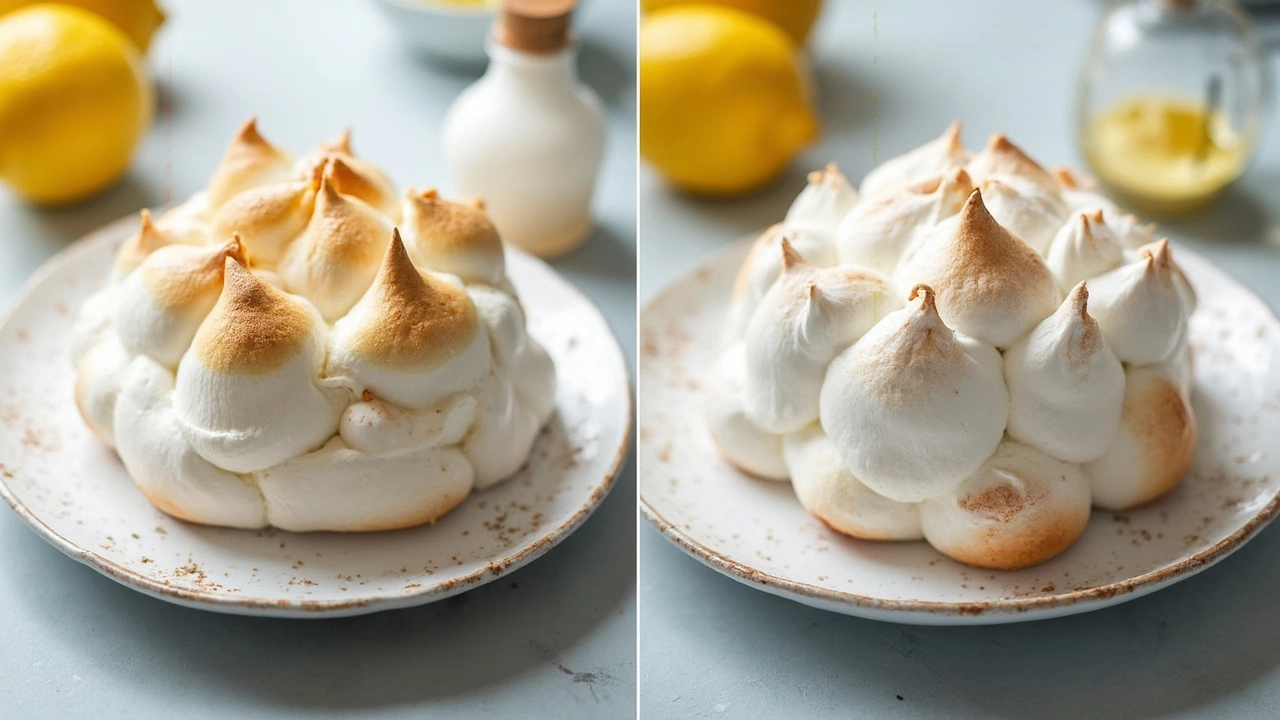
Taste and Texture: What You’ll Notice
The moment you switch out white wine vinegar for lemon juice in your meringue, the changes show up fast. Both are acidic, but lemon juice is tangier and has a clear citrus punch, while white wine vinegar is milder and almost neutral in flavor. Swapping them isn’t going to ruin your pavlova, but you’ll want to know exactly what to expect.
The first difference hits your tongue. Lemon juice can add a fresh zing—some people like it, others find it a bit distracting if they’re going for a classic pavlova flavor. White wine vinegar, on the other hand, is so mild that most folks never taste it in the finished dessert at all. So if you’re aiming for tradition, vinegar blends into the background, letting the sweetness and any toppings take center stage.
Texture is the next thing to watch. Both acids help stabilize the beaten egg whites, giving your pavlova that classic crisp shell and marshmallowy inside. But here’s the surprising part: some bakers have noticed that lemon juice, if you use too much, can make the meringue slightly more sticky and chewy versus the typical pillowy middle. The difference is subtle, but picky eaters will spot it. That’s why sticking to the right amount matters (usually about 1 teaspoon per 4 egg whites, for either acid).
Here’s a quick comparison of what’s going on:
| Ingredient | Flavor Impact | Texture Effects |
|---|---|---|
| Lemon juice | Noticeable citrus tang, can slightly dominate | Can be a bit more chewy; risk of stickiness if overused |
| White wine vinegar | Mild, barely noticeable, fades into background | Classic crisp outside, soft pillowy center |
For anyone with sensitive taste buds, using lemon juice might actually pair nicely with fruit toppings. I use it when I want a brighter flavor, but Jonas prefers the old-school version—less zing, more meringue. Just don’t double up on the acid, and you’ll be safe.
Swapping Ratios and Quick Tips
The big question: if you use lemon juice instead of white wine vinegar in meringue, do you need to adjust the amount? Let’s not guess. For most pavlova recipes, you’ll see about 1 teaspoon of white wine vinegar per 4 egg whites. Lemon juice, though, is a little more acidic, and it also brings water and flavor along for the ride.
The safest bet is a 1:1 swap, but if you want to be super precise, use about 3/4 teaspoon lemon juice for every 1 teaspoon of vinegar in the original recipe. This helps avoid making the meringue too soggy or tangy. Don’t overdo it—too much acid can deflate those hard-earned egg white peaks, leaving you with a chewy or rubbery texture.
- Always add acid after your egg whites are foaming, not before you start whipping. This gets you the best volume.
- Stick to fresh lemon juice, not bottled, for better flavor and fewer additives.
- Taste the meringue base before baking—if it’s already very tart, you can use a little less juice next time.
- Double-check your other ingredients; if you’re also adding cream of tartar or another acid, you may want to scale back the lemon juice a bit more.
Here’s a quick look at the basic swap:
| Original Ingredient | Standard Amount | If Swapping |
|---|---|---|
| White wine vinegar | 1 tsp per 4 egg whites | 3/4 - 1 tsp lemon juice |
One last solid tip: acid does all its magic early on. Once your sugar is fully beaten in and the meringue is thick and glossy, you can relax. Whether you used vinegar or lemon, your meringue should hold its shape as long as you didn’t drown it in juice or vinegar.
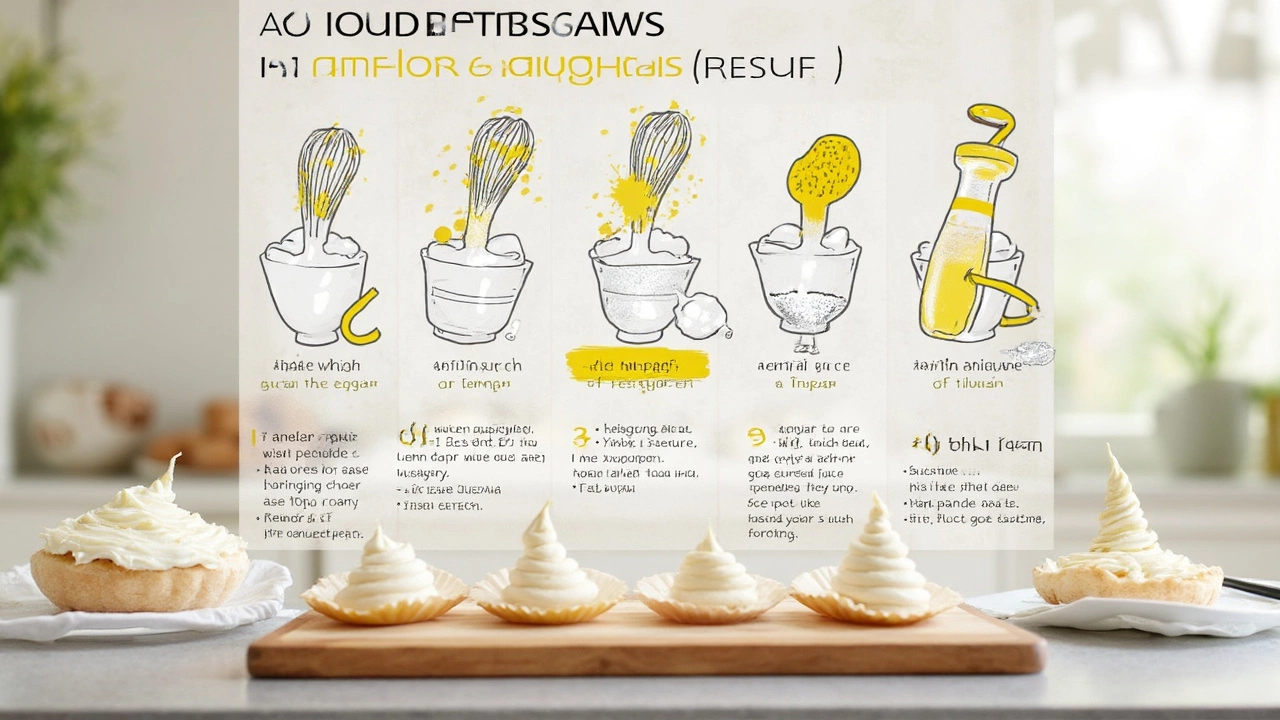
Common Mistakes and Real-Life Advice
Ready to substitute lemon juice for white wine vinegar in your meringue? Before you grab the lemons, let’s talk about the hiccups you could hit along the way. Swapping isn’t rocket science, but there are a few ways things can go sideways if you’re not careful—trust me, I’ve tanked a meringue or two in my own kitchen trying these switches.
- Using too much lemon juice: More doesn’t mean better. A little acid goes a long way, and too much lemon can turn your fluffy meringue into a sticky mess. Stick with half a teaspoon of lemon juice per 4 egg whites; that’s about the same as white wine vinegar and just enough for the science to work.
- Getting pulp or seeds in your mix: Lemon juice should be strained. Even tiny chunks or seeds can ruin that silky texture you want in a pavlova.
- Assuming the taste is identical: Lemon juice will add a slight citrus note that white wine vinegar won’t. It’s not a deal breaker, but if you want a neutral flavor, vinegar is still king.
- Adding acid at the wrong time: The acid should hit the egg whites once they start to foam—not before you whip or after you add sugar. The timing helps keep the structure right.
- Ignoring room temperature eggs: Whatever acid you use, let your egg whites come to room temp first. It makes a massive difference in volume and fluffy texture.
Here's a quick look at how swaps typically work out in the real world, based on home baker reviews and my own trial-and-error hustle:
| Acid Type | Amount per 4 egg whites | Change in Taste | Notes From Real Kitchens |
|---|---|---|---|
| White Wine Vinegar | 1/2 tsp | Neutral | Classic choice, no aftertaste, stable peaks every time. |
| Lemon Juice | 1/2 tsp (strained) | Light citrus tang | Works well, slightly softer peaks, flavor noticeable but fresh. |
A couple more nuggets: never double the acid hoping for extra lift—the excess will actually deflate or overly soften your meringue. Also, if you’re baking on a humid day, even perfect acid balance might not save your meringue (it’ll absorb moisture and could turn chewy or flat). I once had to toss an entire batch because I thought more lemon meant more fluff—major regret. Sticking close to the trusty ratios keeps you safe.
Bottom line? Use lemon juice if you’re in a pinch, but read the label on your bottle, and avoid the temptation to freestyle on the measurements or steps. Pavlova’s a forgiving dessert, but it pays to play by the rules—at least until you nail your own version at home.

